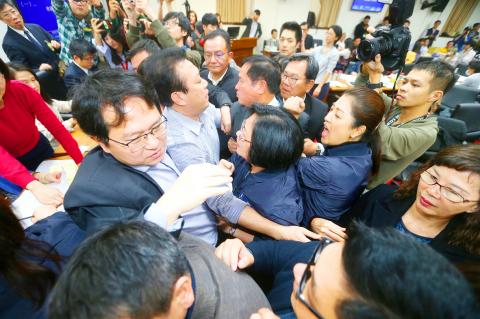The Democratic Progressive Party (DPP) yesterday received more criticism for failing to observe legislative procedures during a review on Monday of a controversial amendment to the Labor Standards Act (勞動基準法).
With the aim of the amendment going into effect early next year, the DPP hoped to push it through legislative committee review by Thursday at the latest to pave the way for its passage by Dec. 31.
The bill, which includes several revisions aimed at increasing flexibility for work hours, is highly controversial and strongly opposed by some labor groups.

Photo: CNA
Two of eight revisions were approved before the DPP decided just before 10pm on Monday to pass the remaining six as a package, in effect ramming them through committee review without discussion.
The measures are now to be sent for cross-party consultation, which can last up to a month, before the amendment can be voted on by a plenary session.
The lights in the committee room went out for about 60 seconds, adding to the bizarre day.
Earlier, during a scheduled daytime meeting, lawmakers scuffled with each other and a speaker was shoved from the podium before the meeting adjourned at 6:30pm.
DPP Legislator Lin Ching-yi (林靜儀), the committee’s convener, said the time allotted to each lawmaker to ask questions on each of the eight proposed articles would be no longer than six minutes.
One after another, opposition lawmakers questioned whether Lin was “overstepping her authority” as the convener by deciding on the time allotment, with Chinese Nationalist Party (KMT) Legislator Alicia Wang (王育敏) saying that there was no provision in written legislative procedures that imposes such a limit.
Lin did not respond to their concerns, telling them instead that they should “treasure” their time to ask questions about the amendments.
The fracas ensued, followed by the committee adjourning for a 30-minute break before resuming for the night session, which was originally scheduled to run until midnight.
Taipei Department of Labor Commissioner Lai Hsiang-lin (賴香伶) yesterday criticized the attempt to hastily pass the amendment, saying that it would leave local governments unprepared and that she was considering taking a few days off in a show of support with labor rights groups.
“The quality and procedure of the review held by the Legislative Yuan’s committee [on Monday] were unfortunate,” Lai said. “Such an important amendment to the law, which concerns work hours, should have accepted more opinions from different perspectives, including suggestions made by local governments and academics.”
Due to concerns about workers only having a required minimum of eight hours of rest between shifts, the previous amendment to the act extended the minimum rest time to 11 hours, which has not been enforced over the past year since its enactment, she said.
Loosening restrictions stipulated by the act puts part of the duty of monitoring labor conditions on local governments, such as requiring companies with more than 30 employees to report exceptional work conditions, Lai said, adding that local governments have very limited authority to conduct such monitoring.
The proposed amendment would allow the definition of exceptional work conditions to be decided through negotiations between workers and employers, she said, adding that whether local governments could impose fines on companies that do not provide meeting minutes as evidence has not been decided, meaning there is ambiguity in allowing self-management and enforcement of the regulations.
The Executive Yuan and the legislature should explain to the public why they are aiming to reduce the minimum rest time back to eight hours, she said.

An essay competition jointly organized by a local writing society and a publisher affiliated with the Chinese Communist Party (CCP) might have contravened the Act Governing Relations Between the People of the Taiwan Area and the Mainland Area (臺灣地區與大陸地區人民關係條例), the Mainland Affairs Council (MAC) said on Thursday. “In this case, the partner organization is clearly an agency under the CCP’s Fujian Provincial Committee,” MAC Deputy Minister and spokesperson Liang Wen-chieh (梁文傑) said at a news briefing in Taipei. “It also involves bringing Taiwanese students to China with all-expenses-paid arrangements to attend award ceremonies and camps,” Liang said. Those two “characteristics” are typically sufficient

A magnitude 5.9 earthquake that struck about 33km off the coast of Hualien City was the "main shock" in a series of quakes in the area, with aftershocks expected over the next three days, the Central Weather Administration (CWA) said yesterday. Prior to the magnitude 5.9 quake shaking most of Taiwan at 6:53pm yesterday, six other earthquakes stronger than a magnitude of 4, starting with a magnitude 5.5 quake at 6:09pm, occurred in the area. CWA Seismological Center Director Wu Chien-fu (吳健富) confirmed that the quakes were all part of the same series and that the magnitude 5.5 temblor was

The brilliant blue waters, thick foliage and bucolic atmosphere on this seemingly idyllic archipelago deep in the Pacific Ocean belie the key role it now plays in a titanic geopolitical struggle. Palau is again on the front line as China, and the US and its allies prepare their forces in an intensifying contest for control over the Asia-Pacific region. The democratic nation of just 17,000 people hosts US-controlled airstrips and soon-to-be-completed radar installations that the US military describes as “critical” to monitoring vast swathes of water and airspace. It is also a key piece of the second island chain, a string of

The Central Weather Administration has issued a heat alert for southeastern Taiwan, warning of temperatures as high as 36°C today, while alerting some coastal areas of strong winds later in the day. Kaohsiung’s Neimen District (內門) and Pingtung County’s Neipu Township (內埔) are under an orange heat alert, which warns of temperatures as high as 36°C for three consecutive days, the CWA said, citing southwest winds. The heat would also extend to Tainan’s Nansi (楠西) and Yujing (玉井) districts, as well as Pingtung’s Gaoshu (高樹), Yanpu (鹽埔) and Majia (瑪家) townships, it said, forecasting highs of up to 36°C in those areas